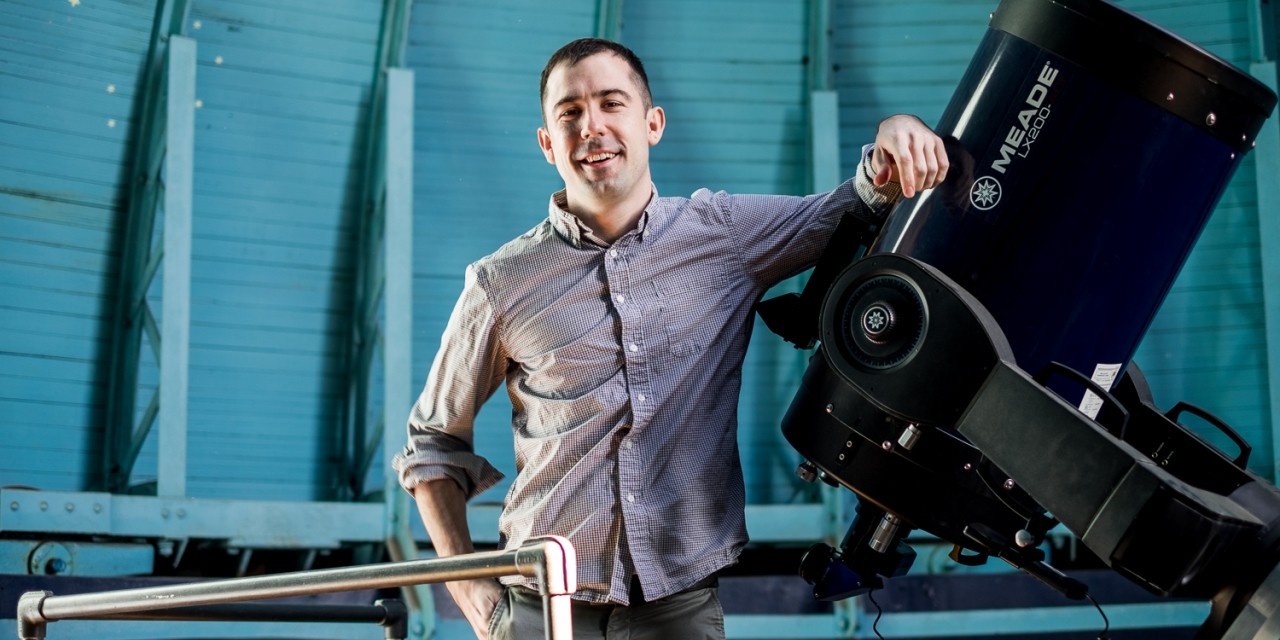Alex Teachey, PhD Candidate in Astronomy

Where did you grow up?
Richmond, VA.
What drew you to your field?
To me exploring the universe—understanding it, grappling with the immensity of space and time—is about as epic as it gets. Astronomy is an ancient field of study, a grand tradition stretching back thousands of years. But it's just in the last few centuries that we've truly been able to probe these deepest of questions, about who we are, where we came from, who else might be out there. Being a part of all of that is an enormous privilege.
How would you explain your current research to someone outside of your field?
I search for exomoons—moons in other star systems around the Milky Way Galaxy. These moons may be great places to look for life outside our Solar System. They could also tell us a great deal about how other systems out there formed, and by extension, whether our Solar System has an ordinary, or unusual, formation history.
What is your favorite thing about being a student at Columbia GSAS?
I love the people here. The faculty, postdocs, and graduate students are all enormously talented scientists, and we have a lot of fun together, too. Of course I love living in New York, and I think Columbia's campus is one of the most beautiful places in the city.
What resources or opportunities that Columbia provides have been most valuable to you?
We're at the center of a thriving astronomical community here in New York, and being at Columbia affords me all kinds of public outreach opportunities, which I relish.
Is there a common misconception about a topic in your field that you wish you could correct? It's not a misconception per se, but I'd like people to really understand why Pluto got "demoted" to being called a dwarf planet. It's not because Pluto isn't an interesting place—it definitely is. It's because there are literally thousands of worlds like it in the outer Solar System, which are just as worthy of our attention!
What do you consider your greatest achievement?
Doing what I'm doing now, honestly. I started my adult life as an actor, and back then I could never have dreamt I'd be capable of doing the kind of work I'm currently doing. I overcame a lot of self-doubt to get to this point.
Who are your favorite writers?
I'm a big fan of Arthur C. Clarke.
Who is your hero of fiction?
Han Solo: charming, fearless, and knows how to get himself into and out of a real mess.
Who are your heroes in real life?
It's hard to think of anyone I admire more than Barack Obama: his extraordinary cool under pressure, his incredible intellect, his measured approach to all things, his commitment to forging real solutions over grandstanding. I wish we had more people like him in public office.
Who in your field do you consider to be a role model?
In our field, there's no one I look up to more than Carl Sagan. Not only was he a great scientist, but he was also spectacularly gifted communicator. We have to share what we do with the public, include them in the awe and wonder of what we learn about the universe, and no one did it better.
If you were to die and come back as a person or a thing, what would it be?
I'd probably just like to come back and be myself all over again, only smarter and better looking. I wish I'd been able to grow up bilingual, so throw that in there. And if I could take my lessons from this life and bring them along to the second go-round, that'd be great.
What music have you been listening to lately?
Jamiroquai, Mac DeMarco, and Vince Guaraldi.
What is your favorite blog or website?
Wikipedia and WolframAlpha.
Where is your favorite place to eat on/around campus?
I love the sushi lunch special at Nikko.
